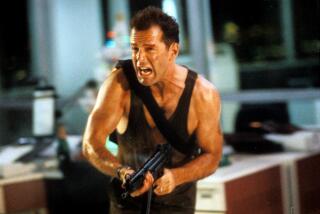Asteroids: Senator at space-threat hearing calls for Bruce Willis
- Share via
Faced with space debris, solar weather and giant space rocks, senators at a subcommittee hearing called for backup in the form of a fictitious asteroid-hunter as they discussed the many space-born threats Earth faces.
“I was disappointed that Bruce Willis was not available to be a fifth witness on the panel,” joked Ted Cruz (R-Texas) during Wednesday morning’s hearing.
“There probably is no doubt that actually Hollywood has done more to focus attention on this issue than perhaps a thousand congressional hearings could do,” he added.
Be as that may, it’s a real-life space rock that seems to have caught congressional attention. The Senate hearing, titled “Assessing the Risks, Impacts and Solutions for Space Threats,” comes about a month after a dramatic meteor exploded over Siberia, causing a shockwave that resulted in roughly 1,000 injuries.
That meteorite caught asteroid-watchers off guard, said James Green, NASA’s planetary science director, because it was coming from a sunward direction; although combined Earthly efforts have identified about 10,000 near-Earth objects, they are typically found by ground-based telescopes that operate only at night.
The Silicon Valley-based B612 Foundation’s plan to send an asteroid-hunting space telescope called the Sentinel into space in July 2018 would solve that problem, Green told the senators.
“We have discovered 10,000 near-Earth asteroids thus far.... Sentinel will discover roughly that number every two weeks,” said B612 chair Ed Lu, a former astronaut and another witness on the panel.
But 2018 may have seemed a long way off to the senators.
“Assuming that we found one before you got your satellite up ... what would an asteroid that is a kilometer in diameter, what would it do if it hit the Earth?” asked subcommittee chair Bill Nelson (D-Fla.)
“That is likely to end human civilization,” Lu responded.
Other witnesses on the panel stressed that Hollywood’s impact on assessing real-life asteroid threats has proved a double edged sword.
“I’m all for Bruce Willis testifying don’t get me wrong, but ... what that movie did was basically convince the American public that if anything bad happened, people would get in the shuttle and go fix it,” said Joan Johnson-Freese, a professor at the U.S. Naval War College. “It was myth.”
Follow me on Twitter @aminawrite.







